Movie Review: Gwanghae, The Man Who Became King
by HeadsNo2

![]()
Sweeping almost every award ceremony since its release last year, Gwanghae, The Man Who Became King (also titled Masquerade) was unsurprisingly a major box office success, going on to become the fourth highest grossing Korean film of all time. High box office ratings and oodles of awards (in one case, maybe too many awards) don’t always guarantee a fun viewing experience, and can sometimes have a negative effect on how an audience goes into the film after the release has come and gone. However, I’m happy to report that for the most part, Gwanghae lives up to all its considerable hype.
Starring Lee Byung-heon in his first sageuk role, Gwanghae is admittedly only the second historical film I’ve seen (the first being Bow, The Ultimate Weapon), so I was pleasantly surprised to see the subject of monarchical reign tackled so often in sageuk get the big screen treatment. There are plenty of similarities to its television counterparts, sure, but what makes Gwanghae stand out isn’t just its gorgeous visual appeal or its masterful acting—it’s the message it conveys, one which many dramas scratch the surface of but have a hard time delving into.
Why are things different here? Because we’re not dealing with a progressive king made so by birthright who just happens to be ahead of his time, but of a man from humble beginnings who suddenly finds himself the ruler of a country. (Unfortunately, unlike all our childhood fantasies, being a king or queen for a day =/= the best day ever.)
Gwanghae, The Man Who Became King is a fictional story which takes place during the non-fictional reign of the title’s namesake, King Gwanghae, the fifteenth king of Joseon. But it’s fiction with a twist—the story deals with a fifteen-day span of Gwanghae’s reign that’s just plain missing from history as it’s recorded in the Annals of the Joseon Dynasty, with the only explanation for it coming from Gwanghae himself in the form of a written entry, “One must not record that which he wishes to hide.”
That’s a premise just ripe for all sorts of wild conspiracy theories, so what our story suggests is that an impostor took the throne for those fifteen days to act as a stand-in for the true king while he recovered from a poisoning attempt. In time, our common man’s eyes open to the injustices of the court as well as the ludicrous nature of politics, and in doing so he becomes a champion of the people. Because unlike the monarch he’s impersonating, and unlike the courtiers claiming to do what’s best for the people, only he knows what it’s like to be part of the collective. He is the people.
This Prince and the Pauper idea is certainly nothing new, but Gwanghae excels by bringing the focus inward, and onto the politics which shaped the nation all while dooming Gwanghae’s rule to tragedy. Different interpretations abound for every king, but Gwanghae is mostly looked upon favorably for his efforts to help ease the burden of taxation on the poorest of his citizens, a progressive move that contributed to the coup which deposed him. That’s why his name stands out among his fellow rulers like Taejo or Sejong—because he was overthrown, Gwanghae was never awarded a fancy posthumous name by history, ’cause history can be unforgiving like that.
Lee Byung-heon plays two roles, KING GWANGHAE and his uncanny lookalike, HA-SUN. Our introduction to Gwanghae is fairly short and leaves us with little to go on as far as lasting impressions of his character, but we can intone that he’s a fairly cruel man, or one who’s simply been hardened by years of political strife as well as the constant fear that he’s the target of a sinister assassination plot.
It’s this ongoing fear that causes Gwanghae to seek out a man who resembles him, enough so that he can act as a decoy at night (and be killed in his stead in case of an attack). Fortunately, they find a jester who looks exactly like him (to the point where you’d think Gwanghae would wonder if he had a secret twin), and he’s a performer perfectly capable of imitating Gwanghae’s very solemn tone, to boot.
Ha-sun is more or less lured by money into taking this very risky job, which starts out simply enough… until Gwanghae is poisoned, and Ha-sun is forced to temporarily take his place to prevent complete political and social upheaval should the truth be revealed.
The main orchestrator behind this immensely dangerous plot is Gwanghae’s Chief Secretary, HEO GYUN (Ryu Seung-ryong), a staunchly loyal and quick-thinking man who knows that politics is about give and take, something he can’t quite seem to drill into Ha-sun’s mind.
He’s one of only two people who know about the kingly swap—there’s also Chief Eunuch Jo (Jang Gwang), and the three of them end up working together to fool the court, to sometimes hilarious effect.
The comedy in Gwanghae is somewhat surprising, not just because there is so much of it, but because it’s handled by drawing upon the absurdity inherent in the premise. Here’s a common man suddenly thrust into kingly robes and forced to live a life he could never dream of. Not inherently very funny, right? But what Gwanghae does is take into account that Ha-sun would have no idea that the king doesn’t use a chamber pot—instead he defecates into a specially designated bowl while in the audience of a roomful of court ladies who cry “Congratulations!” when he takes a royal poo. I don’t know why I found this moment and others like it so funny, but I’d venture to guess that it’s because these are things you don’t really consider when you watch all those kings on television.
What starts out as a paid job for Ha-sun quickly turns into something more as he gets to know the people in the palace. These include the aforementioned Eunuch Jo as well as his young official royal taster Sa-wol, with whom Ha-sun finds a connection with because of an earlier misdeed he perpetrated against another girl her age.
Ha-sun may be able to look and act like the king, but it’s in the smaller moments where he begins to realize just how much useless power the king actually possesses, and how much power the king should have but can’t exert because of the delicate political balance. This comes to the fore through simple realizations on Ha-sun’s part, like when he finds out that the court ladies of the palace can only eat the leftovers from his table (he’d previously been gorging himself), since they aren’t allowed to cook for anyone but the king. So he starts with simple things like leaving plenty of food after his meals for the court ladies to enjoy, along with ordering things he knows Sa-wol enjoys so that she can eat them once he doesn’t.
He’s moved to tears by Sa-wol’s plight when she reveals how she came into the palace, which involved being sold into slavery and separated from her mother when her father couldn’t pay outlandish taxes imposed upon his meager amount of land. She’s a direct result of the broken system Gwanghae has been unable to fix because of vicious retaliation by wealthy, landowning ministers—that taxes are imposed equally, and not according to how much land is owned. Anyone with an ear for modern politics will find what Ha-sun believes relevant today: “It’s only fair to impose tax according to how much land you own. Those who have more should contribute more.”
But this was as much a sensitive topic for Joseon as it is today, since taxes are (unsurprisingly) still universally abhorred. Being unaware of the intricacies involved in political dealmaking, Ha-sun is unable to grasp why, as king, he can’t actually do anything he wants, and why everything must run through the court. (There’s an argument about checks and balances being made here, only it’s against the system of checks and balances and more for an absolute monarchy. Which you do end up rooting for in the scope of Gwanghae, if only because Ha-sun seems to have a knack for ruling.)
Another law on Ha-sun/Gwanghae’s plate involves making identity tags mandatory for all citizens, and like the taxation law it’s made relatable to Ha-sun through yet another court servant, Eunuch Jo. We first see Jo as just a silent spectator, seemingly appearing from the shadows at will, but as he begins to identify with Ha-sun—perhaps before he consciously realizes it—he also finds himself helping Ha-sun when the impostor king wants to learn just a little bit about the laws he’s blindly passing into existence.
It’s through their growing bond that Ha-sun finds out that Eunuch Jo willingly became a eunuch because of the identification tag system, since enforcing it has a direct correlation to citizens either fleeing the country in order to avoid forced labor, or men voluntarily castrating themselves. So naturally, all this input starts to form Ha-sun’s opinions on the matter, only for these fifteen days he’s actually in a position to do something to help his fellow man.
Ha-sun begins to grasp just how petty politicking can be when he acts on his own to impose the tax reform law, only to find that he’s damned his brother-in-law in the process, since he’s being held on exaggerated charges as a sort of hostage by the ministers against him.
This is how he comes to meet Gwanghae’s wife, Queen Consort JOONG-JUN (Han Hyo-joo), someone who’s repressed by palace etiquette to the point where smiles are foreign to her, though still adamant enough to declare that she’ll kill herself if her brother dies. Ha-sun reveres her as a citizen does a queen and is shocked into helping her, only because he wants to do what’s right, even though doing the right thing seems to be a severely punishable offense in the palace.
What’s refreshing about how Ha-sun deals with the various problems presented to him is his sense of realism, and his ability to cut through all the political bullshitting that regularly goes on to get to simple truths. He’s got a heart to help the people without the foreknowledge of how to play the right games with the court, and because he’s been raised as a citizen he believes the king can do anything. He’s wrong on that, but not completely, and slowly but surely he starts to win over everyone close to him – including Eunuch Jo, Sa-wol, and even Secretary Heo.
It’s no secret that Gwanghae’s greatest enemy is Minister of Interior PARK CHOONG-SEO (Kim Myung-gon), who singularly holds up the weakest aspect of the film—the villains. We’re told who’s against Gwanghae, and we get a few lines as to why (he’s rich and doesn’t want more taxes, he wouldn’t like any law passed by Gwanghae even if he himself personally wrote it, because all ministers must be enemies to the king in every sageuk ever), but past that we’re just supposed to take it on faith that the court just doesn’t like Gwanghae.
Considering how the film explores deeper stuff like commonality across class divides and the responsibility of a monarch to rule with compassion, the scheming ministers seem superficial, one-dimensional, and evil for the sake of it—we’re never allowed to connect to see their point of view, or why any view alternative to Ha-sun’s might have been equally viable. That sort of connection is sacrificed so that Ha-sun gets to shine like a white knight, which is all well and good for the purposes of this film even though the conclusions are all very obvious. Gwanghae doesn’t necessarily give us things to ponder and form our own opinions on, but rather tells us that Ha-sun has the best opinions because he’s the one in this story with the most heart, and we’re just along for the ride.
This tactic completely works for the essentially commercial film Gwanghae is, and it certainly doesn’t bring the quality down one bit. But it does present a missed opportunity to elevate the experience to that next level, since the supposition that baddies are just bad because the script says so is the sort of thing that tends to wear after a while. Especially in sageuk, where baddies are bad because they’re ministers, and kings are good because they’re kings.
It’s something of a shame that we don’t get to know the real Gwanghae all that well, though the little we see of him isn’t promising, especially when he feels no pity or compulsion to spare Ha-sun’s life after he’s essentially saved his hide for two weeks. We’ve come to know Ha-sun and like him, and so have the members of the court (that aren’t the eeevil ministers), and it’s hinted that Gwanghae has a thing or two to learn from the man who played him while he was away. That’s something I would have liked to see explored in greater detail, but this story isn’t about Gwanghae the king, it’s about the man who became king. And this movie excels at telling just that tale.
The performances were top-notch, especially from Lee Byung-heon, who exceeded all my expectations and then some. It doesn’t hurt that I already held his acting abilities in high esteem (since he tends to command whatever screen he’s on), but the range he displayed as Ha-sun/Gwanghae was pretty darn exceptional. Not only did he have to portray two very different men, he also had to convince us of Ha-sun’s growth as a person from a money-driven jester into a true man of the people, and into a king that everyone could believe in.
Ryu Seung-ryong can shine even in a ramyun commercial, so it’s no surprise that he’s his typical awesome self in yet another successful film, selling any role he’s given with panache and class. I can’t say as much for Han Hyo-joo since we did see so little of her, though I can say that the characters I enjoyed most aside from the top two were Sa-wol and Eunuch Jo, both written and acted with believability tailor-made to tug at the heartstrings.
The Bottom Line: What Gwanghae excels at most of all is its portrayal of authentic character conflicts set against a sumptuous visual palette, aided in no small part by Lee Byung-heon’s superb performance. Functioning as a politically-driven and surprisingly relevant human drama, Gwanghae asks us to evaluate the qualities of a man that set him apart from other men—regardless of upbringing or circumstance—and to find in those tendencies toward compassion and mutual respect those qualities which make him worthy to be a leader. 9/10.
RELATED POSTS
Tags: featured, Han Hyo-joo, Lee Byung-heon, Ryu Seung-ryong
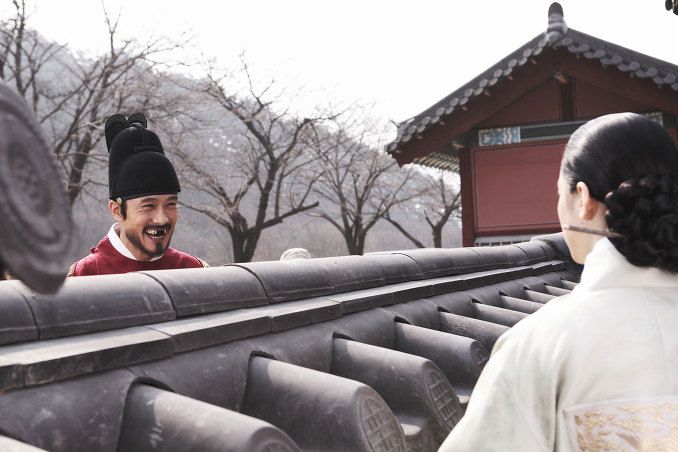
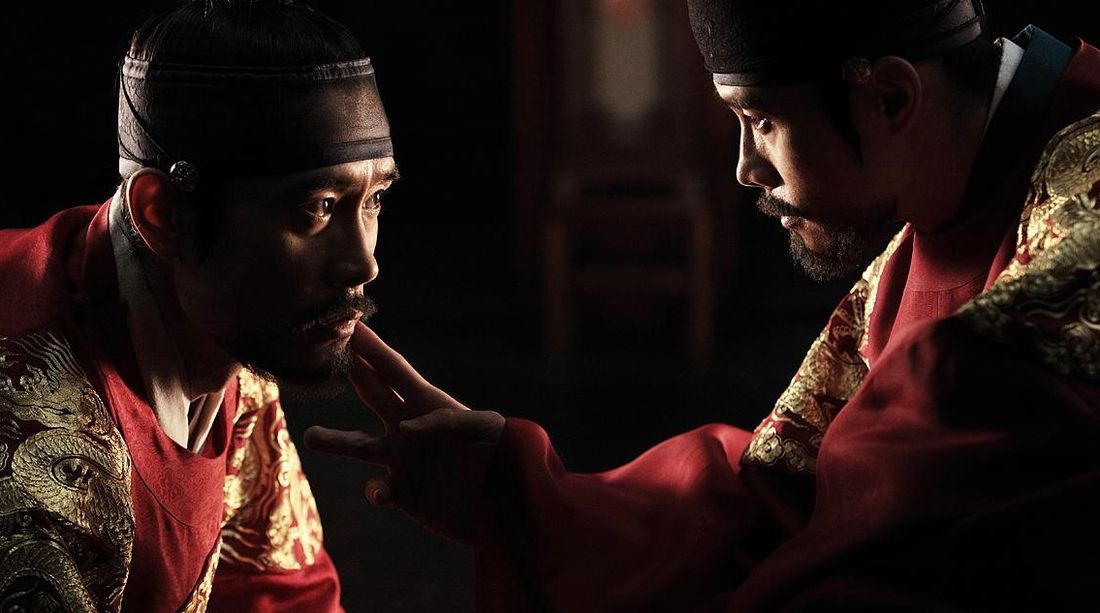
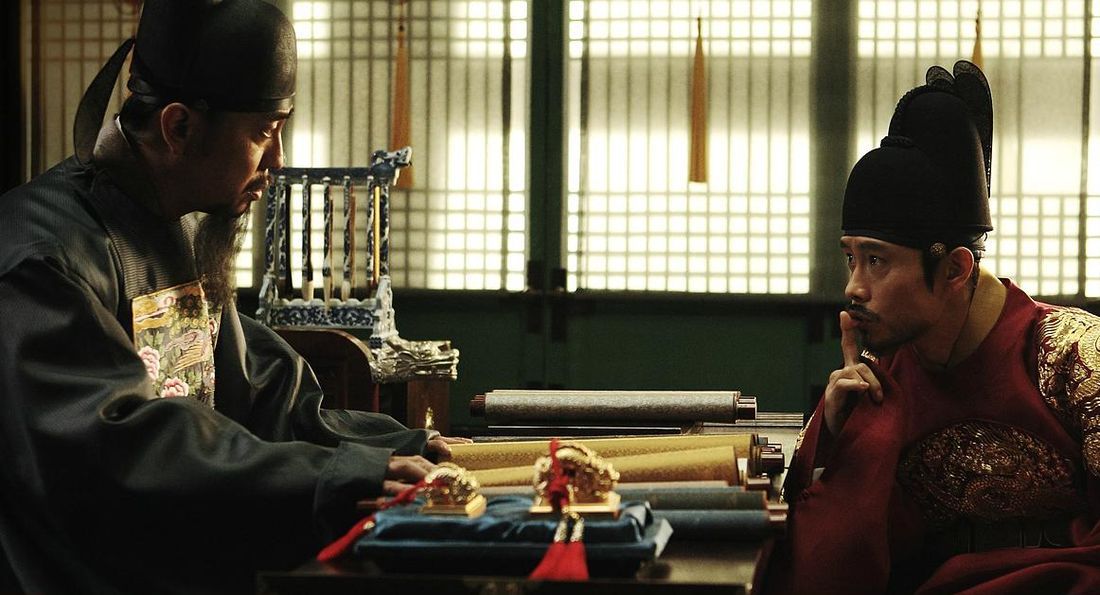
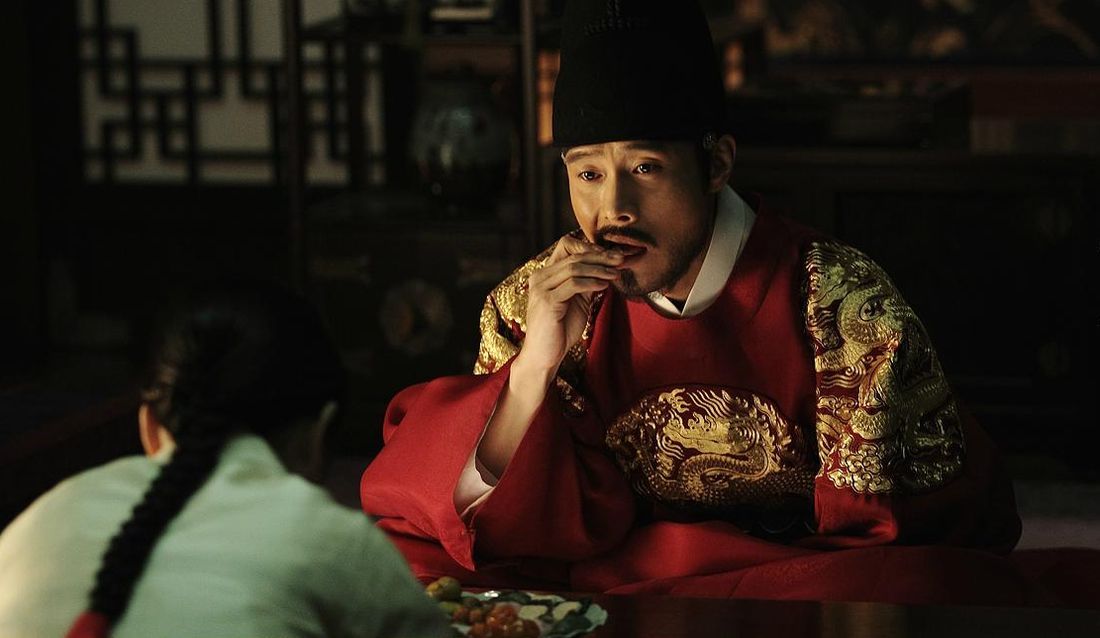
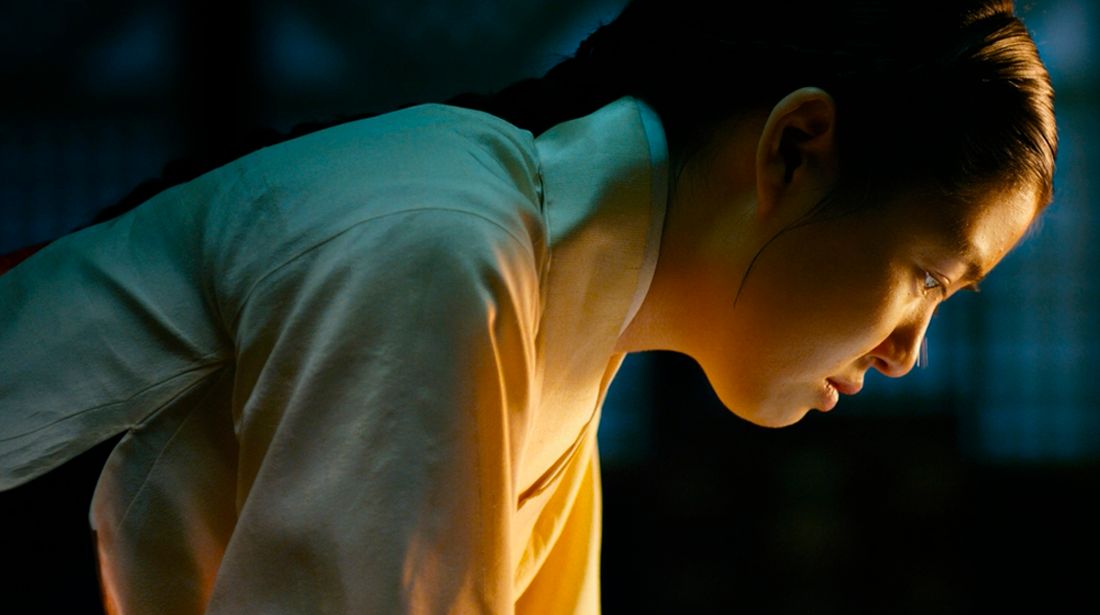
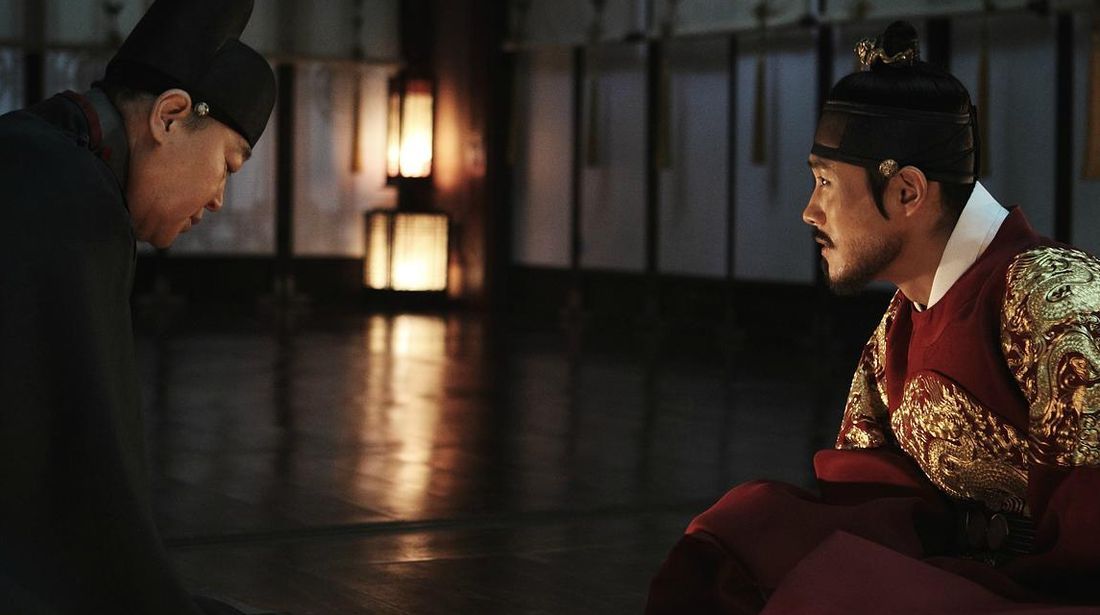
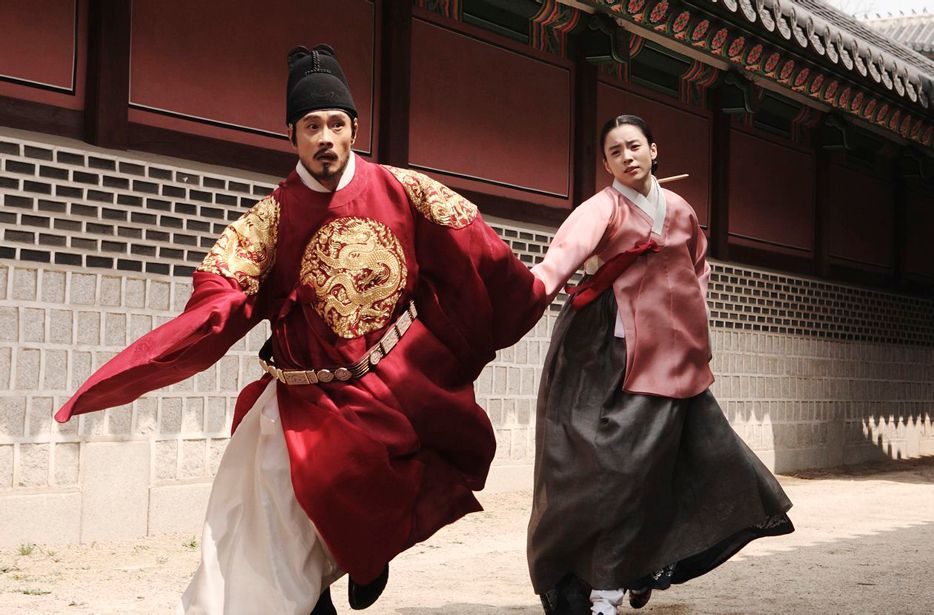
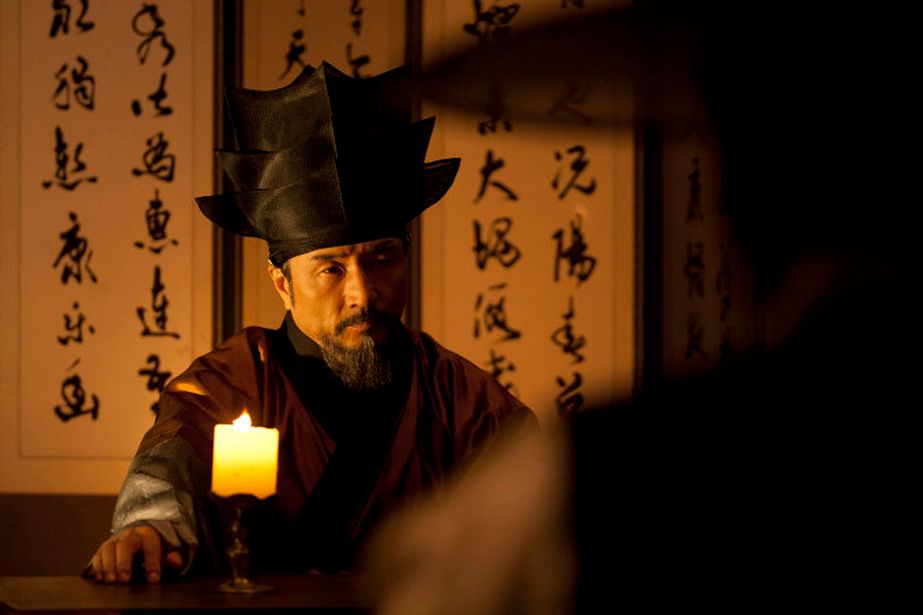
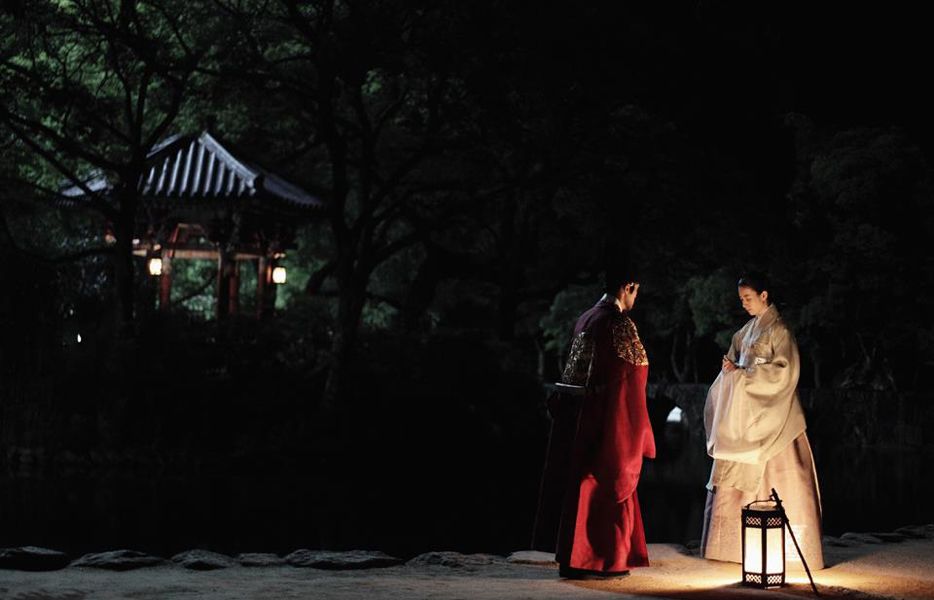
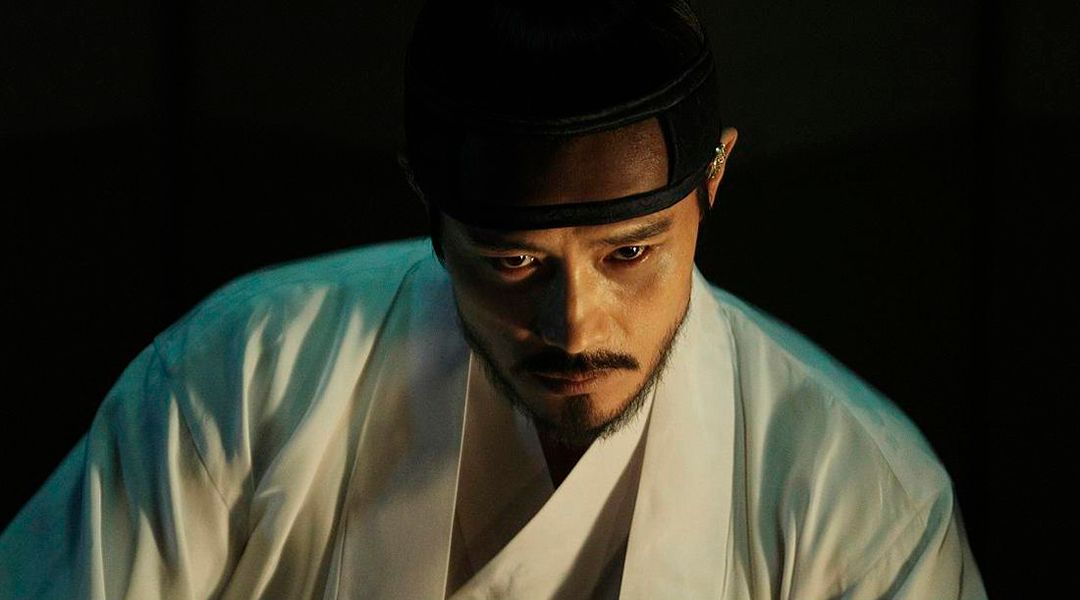
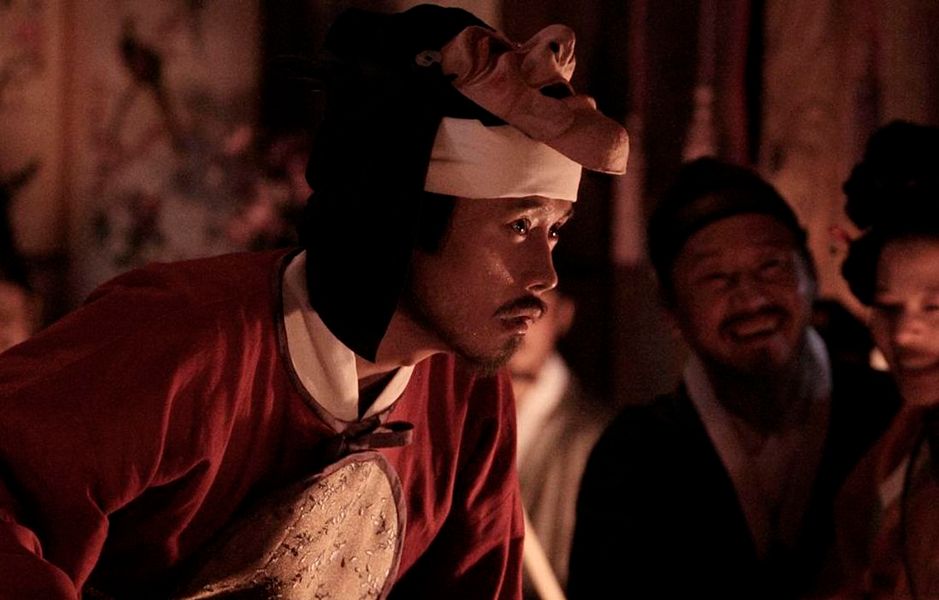
 Interview with Kim Yoo-jung
Interview with Kim Yoo-jung Hello Dramabeans series
Hello Dramabeans series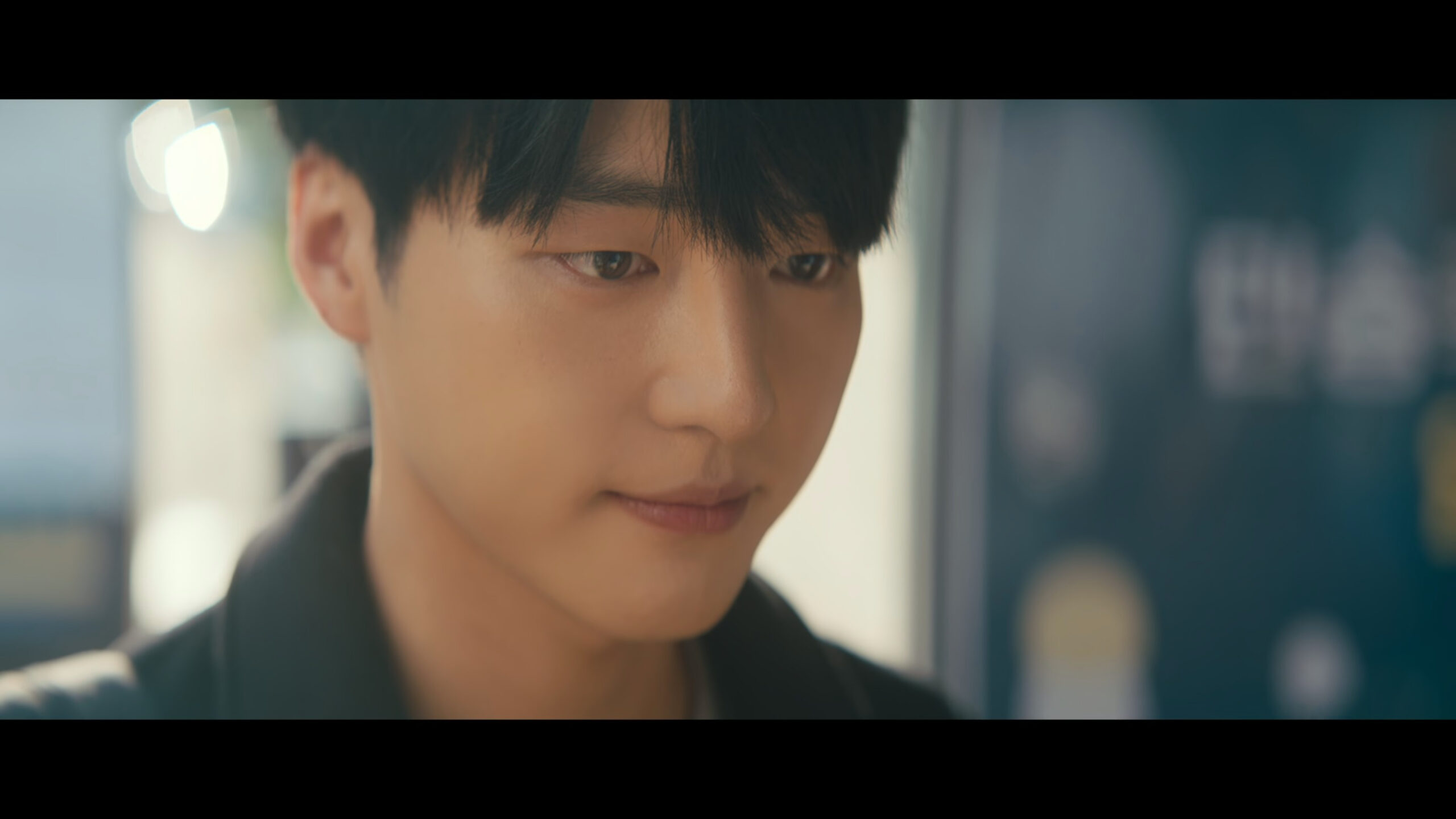
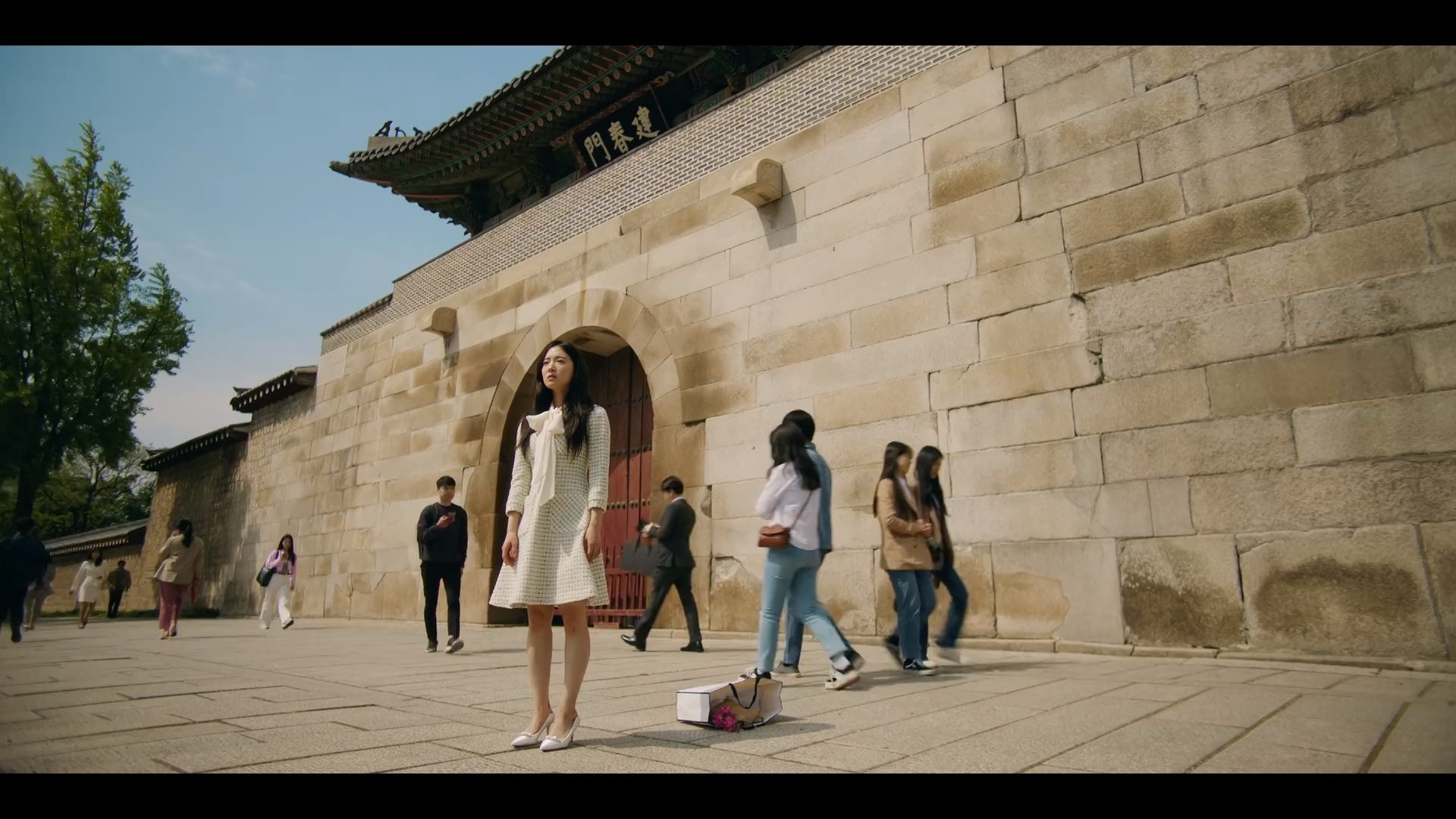


![[2022 Year in Review] The Bean Count](https://www.dramabeans.com/wp-content/uploads/2022/11/beancount_2022.png)

Required fields are marked *
Your email address will not be published. Required fields are marked *
1 snow_white
May 18, 2013 at 12:49 PM
Thanks for the review :-)
Required fields are marked *
2 Joy
May 18, 2013 at 12:50 PM
I need to watch this soon >_<
Required fields are marked *
3 exquisitemelody
May 18, 2013 at 1:11 PM
Thanks for the review! Didn't read it all because I don't know how spoilery it is, and I think I want to check this one out! Is it subbed online anywhere?
Required fields are marked *
eleanor
May 18, 2013 at 1:31 PM
It is subbed online. I found it fairly easily by googling: Masquerade Korean movie watch...if that helps. There is also a US DVD version coming out in June.
Required fields are marked *
Momos
May 19, 2013 at 8:22 AM
Just watched this the other day on azdrama.net
Required fields are marked *
liz
May 18, 2013 at 3:39 PM
on youtube you can find it 720p ^^
not sure how the subtitle is reliable though
Required fields are marked *
hhisc
May 18, 2013 at 3:52 PM
its also on dramacrazy with subs
Required fields are marked *
4 eleanor
May 18, 2013 at 1:20 PM
Thank you for the great review! I have been wanting to watch this for a while now, and this convinces me that I really should.
Required fields are marked *
5 DarknessEyes
May 18, 2013 at 1:48 PM
Thanks for the review! I didn't really want to watch this one, but I did kinda want to know how the story went :D
Required fields are marked *
6 Kiara
May 18, 2013 at 1:51 PM
Love you ladies :). Thank you so much for all the movie news and reviews.
Required fields are marked *
7 Dramafed1782
May 18, 2013 at 1:56 PM
Thank you for the review :) !!!!
Required fields are marked *
8 Jo
May 18, 2013 at 2:26 PM
I feel as though the villians were not truly explored because it is assumed that the Korean audience already knows this part of history. We understand that later Gwanghae would be dethroned, and there were many reasons for it etcetc
Required fields are marked *
9 Yana
May 18, 2013 at 3:39 PM
It's a good movie. I had a good time watching this alone, it would be even better watching with other people. As usual, Lee Byung hun is a good actor.
Required fields are marked *
10 hhisc
May 18, 2013 at 3:51 PM
Loved this movie
Required fields are marked *
11 kdramafan
May 18, 2013 at 4:13 PM
Thanks for the recap Heads. I really enjoyed this movie. Sure a lot of other Beaners will too.
Required fields are marked *
12 nana
May 18, 2013 at 4:23 PM
I just watched it last night and now you guys made the review. So excited
and yes, Lee Byung Hun plays very well to act two characters.
You forgot to mention Do Bo Jang, the swordsman.
I laughed so hard when he cried in the certain scene, and made me cry in the last scene.
And I think this movie deserves those awards
Required fields are marked *
13 anais
May 18, 2013 at 5:05 PM
Really enjoyed it. I still laugh remembering the scene when Minister Heo and the "king" forgot that they'd already switched seats and had to double-switch in time. Hilarious. And the royal guard, heartbreaking.
Required fields are marked *
ck1Oz
May 18, 2013 at 5:57 PM
I am not planning.f to watch this movie.Can I have spoilers if it's clearly marked?Thank you.I want to know the ending.Especially now that there are 2 mentions of a swordsman.
Required fields are marked *
14 Seehorce
May 18, 2013 at 6:40 PM
Bittersweet. Such a great watch.
Required fields are marked *
15 Zareen
May 18, 2013 at 7:36 PM
Absolutely gorgeous movie visually. Everyone was on point in terms of acting (except han hyo joo. I don't get her appeal?? She seemed one dimensional to me). Also, tears everywhere during sawol's sacrifice scene.
Required fields are marked *
Dada
May 19, 2013 at 8:03 PM
i agree with you about han hyo joo. she is not an amazing actress but she is easy on the eyes (very beautiful). plus, her ceo is lee byung hun so she often gets leading roles with a lot of top actors even tho she is a so-so actress. i pity actresses like lee yoon ji who has been doing supporting roles for 10 years even though she is a much better actress.
Required fields are marked *
16 giddy
May 18, 2013 at 8:21 PM
Thanks for the great review, HeadsNo2. Loved the movie for the same reasons--brilliant acting and the humanity aspect of the royals that we never consider. Loved the way they ended the film as well (something that I can't always say about kdras and films). I already pre-ordered it from Amazon!
Required fields are marked *
17 cv
May 18, 2013 at 8:31 PM
Thanks for review. I liked it also. Didn't think it was going to be comical at all but loved those moments from the otherwise serious acts. As sageuk movies goes, this is up there in my top five.
Required fields are marked *
18 Fun-Lugha
May 18, 2013 at 9:12 PM
Reminded me of Lee Jun Ki when he was a performer shaking his bootay! Lols
Loved it, funny i never really paid much attention to LBH until this movie, then i worked my way backwards and watched all his previous box office hits-very impressive!
Required fields are marked *
19 crizzyville
May 18, 2013 at 9:20 PM
great timing of your review heads! Just finished downloading this and will schedule to watch this after dinner tonight.. Thanks! I just got this page bookmarked!
Required fields are marked *
20 enz
May 18, 2013 at 9:22 PM
I caught this on a plane and thoroughly enjoyed it. I did in small bits think it exaggerated a little how good a guy the man who replaced the king became. but never having watched anything of lee byung hun ( being relatively new to k land), I was really awed by his acting. he IS GOOD.
definitely not just a great piece if abs or ass!:p
Required fields are marked *
21 Kay
May 18, 2013 at 9:41 PM
I recently just watched this and absolutely loved it! I've never watched Lee Byung Hun in anything and I can see why he's so well regarded in the industry - he was phenomenal. The crossover between his roles was flawless. The story was great, with good pacing and dialogues. Not to mention, the cinematography was beautiful, the color scheme used was so different compared to watch I've seen in other saeguks.
Definitely recommend this movie!
Required fields are marked *
22 rubie
May 18, 2013 at 10:09 PM
Thanks so much for the truly heart-warming review. Really awesome feeling reading the feedback, word for word wonderfully written. A treat earlier than expected. Phew!
Agree the seat-switching between LBH and RSR were too funny despite it's a repeat, still came out even more hilarious the second time. Kim In Kwon as the royal guard simply awesome as well. The last scene of him and Ha Sun just so heartbreaking.
I was watching LBH scenes in I Saw the Devil last night.. mainly because missing the actor on the big screen. He's especially sexy & attractive despite the extremely brutal & unspeakable gory movie.
Really hope he'll be back soon in another Korean movie or drama series, if we are so lucky. ^^
Btw, Lee Byung Hun will be in RED 2 this July 19, worldwide release.
http://everythinglbh.com/entry_view.php?id=2412
Required fields are marked *
Enz
May 20, 2013 at 9:31 PM
Thanks for this! I LOVED red!!
Required fields are marked *
23 KDaddict
May 18, 2013 at 10:48 PM
I saw this movie and liked it. I love these 2 guys--they are both acting power houses. This film shows us a side of their acting that we (or I) haven't seen before. The leading lady is perfectly cast for her char, and she plays the role just rightl. The script is tight and logical. What is there Not to like? Highly recommended.
Required fields are marked *
24 Chizzy girl
May 19, 2013 at 2:48 AM
this movie was just is at the height of epicness.....i love everything about it....when i finished it i felt some sadness because i wanted it to go on....i was so lost in the story that i hardly noticed how much time i spent watching it.i watched it out of curiousness but stayed watching because of the story..LOVED,LOVED,LOVED IT!
Required fields are marked *
25 exquisitemelody
May 19, 2013 at 2:57 AM
Yay, after getting a glimpse of your review, I checked it out, and I'm happy to say I finally finished my first korean movie! I've started a few, but this was the first one I actually finished. I guess my partiality toward historical dramas helped :)
LOVED LOVED LOVED this!! I got to quench my thirst for historical dramas in only 2 hours. I was sort of glad we didn't dwell on the baddies too much - I'll just substitute every evil meeting that ever happened in sageuks into it.
I was so surprised how funny it was!! I was laughing so many times, it was great!!
Maybe because I already had Dong Yi in mind, but the king sort of reminded me of the king in Dong Yi - a bit of a goofy side.
Also gotta give a shoutout to the people who did the score for the movie - REALLY GREAT!! Just the right amount of emotion. It really put a finishing touch on a great film.
Thanks for the recommendation! This might have been the first new movie (regardless of language) that I've finished in a very long time (dramas have ruined me...movies seem too fast :P)
Required fields are marked *
exquisitemelody
May 19, 2013 at 3:00 AM
Also, gotta give the man some credit for making me LOVE the fake king, but definitely making me NOT love the real one. It's kind of weird to think about how different they are, but it's the same actor.
Required fields are marked *
26 CaroleMcDonnell
May 19, 2013 at 8:45 AM
Oh my gosh, HeadsNo2, what a great review! I just saw this and really liked it, although there were a few moments which felt a bit lacking...as in the depiction of the baddies. It had a sweet predictability about it but at the same time I wish the predictability had had more of a sense of dread about it. It could easily have been half an hour longer, i think. In that way we would've seen more of the real king, and maybe seen the deeper distress of the queen in the real king's presence. But all that said, it was a good story.
I am so turning into a lover of Joseon history. Thanks so much for the recap.
Required fields are marked *
27 Net-chan
May 19, 2013 at 11:52 AM
That was a great movie. Lee Byung Heon at his best in my opinion. If I had to say something bad about it, well... I wish the story wasn't too centered on the substitute king. Of course, he's the main character, but that would have been interesting to see more of the pre-substitute king era, to get how the baddies came to be so bad. And to see how the queen's brother got caught in all that too, I didn't really get it.
I loved the little moments of humour, it made the film all the better (the guard, the chief eunuch, the fake king's pooping, the kitchen maids, the State Secretary). Nice bromance between the State Secretary and the substitute king by the way haha.
Required fields are marked *
28 Cherry
May 19, 2013 at 3:43 PM
This is 10 out of 10 for me ♥
Required fields are marked *
29 mayrani
May 19, 2013 at 7:25 PM
definitely recommended! ^^
Required fields are marked *
30 mayrani
May 19, 2013 at 7:25 PM
extremely recommended! ^^
Required fields are marked *
31 Mary Dlight
May 19, 2013 at 8:22 PM
Yeah, found something new to watch!!
Required fields are marked *
32 ganesh aaglave
May 19, 2013 at 11:27 PM
bollywood news
Required fields are marked *
33 ganesh aaglave
May 19, 2013 at 11:28 PM
recommended
Required fields are marked *
34 innit
May 19, 2013 at 11:44 PM
Watched it and didn't like it. I think watching Masquerade and I am King back to back was an extremely bad idea since both movies are 80% similar.
Required fields are marked *
35 Rovi
May 20, 2013 at 12:18 AM
At least they didn't explore Prince Gwanghae's rivalry with his stepmother Queen Inmok, stuff of 90's and early 2000's sageuk that tend to dramatize it. Nor even showed Kim Gae-shi (his infamous concubine who resorted to bribery, 'til the very end) for that matter.
Two examples of "traditional" Prince Gwanghae stuff are "Seogung (The Western Palace)" in 1995 starring then younger Lee Young-ae as Kim Gae-shi, Lee Bo-hui as the Queen, and Kim Gyu-cheol as Prince Gwanghae.
"The Western Palace" was in reference to Queen Inmok's monicker, wherein she was deposed, I don't really understand about how she got that nickname.
The last one is "The King's Woman", 2003, starring Park Seon-yeong (after doing "Jang Hee-bin") as Kim Gae-shi, Ji Seong as Prince Gwanghae, Im Dong-jin as father Seonjo, and Hong Su-hyeon as Queen Inmok. This was to reference of gossip that Kim Gae-shi was Seonjo's concubine first, before becoming the son's concubine later.
Required fields are marked *
36 justanotherbeanie
May 20, 2013 at 12:37 AM
just finished watching this movie..
read the review and felt intrigued but i wasnt curious enough to actually watch it.. until few hours ago
I was feeling bored and needed a good film to pass the time and decided to give this movie ago. No regret! It wasnt flawless nor it is epic, but it was refreshing with feel-good ending (in case some of you wondering it had a happy ending ~sort of) The film was light, with unexpected comedy crept out now and then, and several characters that you cant help but adore :)
So yeah, if you got time to waste like me i dont think it hurt to just try and watch this film, see if you'll like it<3
Required fields are marked *
37 kpshyazn
May 20, 2013 at 7:48 AM
Loved this movie.
The minister Heo is the same person who is credited with writing the book: "Hong Gil Dong".
Required fields are marked *
38 Nelly
June 14, 2013 at 1:30 AM
Does anyone know what Ha Sun gave to the queen at the end? He seems to give back to her the dagger that she threatened to commit suicide with but it looks different. Towards the end she opens the dagger and it looks like something else and she sighs. This part is driving me crazy. HELP
Required fields are marked *
HeadsNo2
June 14, 2013 at 5:46 AM
He gives her the dagger without the blade, since he wanted her to live no matter what.
Required fields are marked *
39 kimchi pop
June 17, 2013 at 12:55 PM
I wanted to like it wholeheartedly but out of sheer honesty I had to admit to myself and the friend who went to see it with me that it just wasn't that great. It is beautifully shot and the cast was amazing but it was so drawn out that by the middle of the movie I was bored. Watching it to the end didn't do anything to change my mind either.
Required fields are marked *
40 arina
September 16, 2013 at 4:18 AM
what makes this movie wonderful is the actors fantastic performance....
Required fields are marked *
41 Beez
June 4, 2016 at 2:20 AM
I was hoping to have something explained to me that neither watching the movie nor reading the review addressed:
How exactly how fo the identification tags deal with forced labor? And even more curious as to why would someone become a eunuch because of it?
Required fields are marked *